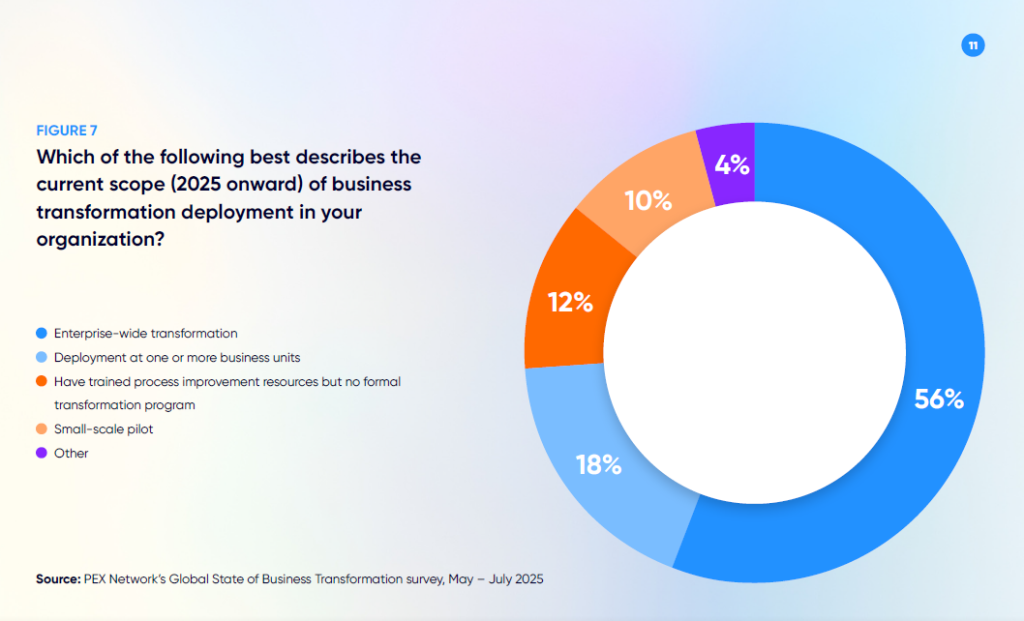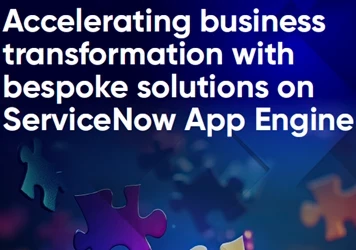Enterprise-wide business transformation surges as organizations go all-in
The number of organizations deploying enterprise-wide business transformation is up notably compared to 2024
Add bookmark
More than half of organizations (56 percent) are deploying enterprise-wide business transformation strategies, with even more considering business transformation to be mission-critical.
That’s according to the PEX Report 2025/26, based on the results of a survey of more than 200 professionals.
The number of organizations deploying enterprise-wide business transformation is up notably compared to last year (48 percent) and 2023 (27 percent). Only 18 percent are doing so at one or more business units, down from 21 percent in 2024, while 10 percent of businesses are deploying transformation via small-scale pilots, up from 7 percent last year.
Join the PEX Network community

Don't miss any news, updates or insider tips from PEX Network by getting them delivered to your inbox. Sign up to our newsletter and join our community of experts.
Learn MoreThe importance of enterprise-wide business transformation
Business transformation programs that span the whole enterprise are about three-times more likely to hit their targets than siloed efforts, according to multiple cross-industry surveys, said Ricardo Henriques, transformation leader and business automation professor at Católica Lisbon School of Business and Economics.
“Market forces such as technology disruption, regulatory pressure and shifting stakeholder expectations cut across functions, so partial fixes merely push bottlenecks downstream,” he added. “Enterprise scope also enables shared data, unified governance and cultural coherence, factors linked to profit-uplifts exceeding 20 percent versus peers. In short, only an organization-wide lens can convert ambition into measurable, sustainable results.”
Successful programs should start with a clear “northstar” vision, quantified business cases and executive accountability, while research shows that combining structured change management, ongoing communication and post-go-live reinforcement doubles long-term adoption rates, Henriques said.

Register for All Access: AI in Business Transformation 2025!
How do businesses measure transformation success?
Business topline growth is the leading measure of business transformation success, cited by 25 percent of respondents, the PEX Report found. This is followed by increased throughput/efficiency (22percent), cost savings (17 percent) and customer acquisition and retention (10 percent).
Improved customer satisfaction is the next most common (6 percent), just ahead of employee engagement/retention (5 percent), employee productivity (4 percent) and reduced operational risk (3 percent). Other measurements of success include the number of projects completed (3 percent) and overcoming disruption (2 percent) along with achieving strategic vision across business processes and scaling remote working.
“If 25 percent of organizations are chasing topline growth and 22 percent are chasing efficiency, most companies are still grading transformation on the scoreboard, not the playbook,” argued internationally renowned digital transformation thought leader and Top LinkedIn Voice Jeff Winter. “Cost savings at 17 percent is the easiest story to pitch to finance but the weakest fuel for long-term momentum,” he said.
Businesses should measure what actually compounds: revenue quality, not just quantity; throughput that creates capacity for new value, not just squeezes the current line and cultural adoption, not just go-lives, Winter added.
“Track leading indicators such as speed of decision-making, time from insight to action and percentage of processes digitized end-to-end so you know the engine is healthy before the quarter closes.” It’s about making the “why” visible, not just the “what,” and tying it to outcomes people care about so they opt in instead of simply complying.
All Access: AI in Process Excellence 2026

Don’t get left behind. Join us at All Access: AI in Process Excellence to learn from leading experts, thought leaders, and practitioners who are on the ground experimenting, researching, and learning how to best use AI. They will share their secrets with you for free. And you’ll have the opportunity to network with fellow professionals as we navigate this new world. Register now to save your spot.
Register Now
















